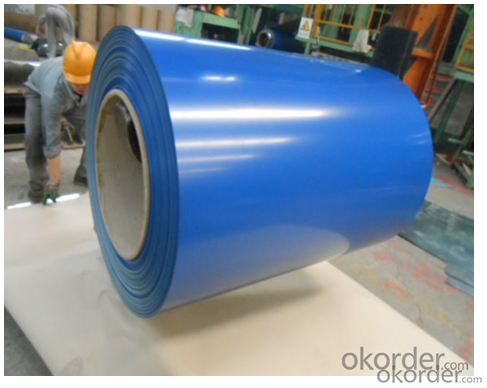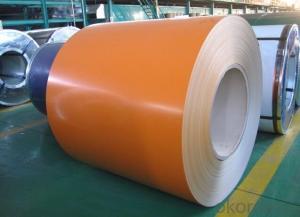Pre-Painted Galvanized or Aluzinc Steel Coil with Best Quality from China
- Loading Port:
- Shanghai
- Payment Terms:
- TT OR LC
- Min Order Qty:
- 100 m.t.
- Supply Capability:
- 10000 m.t./month
OKorder Service Pledge
OKorder Financial Service
You Might Also Like
1. Pre-Painted Galvanized/Aluzinc Steel Coil Description:
With GI as base material, after pretreatment (degrease and chemical treatment ) and liquid dope with several layers of color, then after firing and cooling, finally the plate steel is called pre-painted galvanized (aluzinc) steel. Pre-painted galvanized steel is good capable of decoration, molding, corrosion resistance. It generally displays superior workability, durability and weather resistance.
2.Main Features of the Pre-Painted Galvanized/Aluzinc Steel Coil:
• Excellent process capability
• Smooth and flat surface
• Workability, durability
• Excellent heat resistance performance
• High strength
• Good formability
• Good visual effect
3.Pre-Painted Galvanized/Aluzinc Steel Coil Images

4.Pre-Painted Galvanized/Aluzinc Steel Coil Specification
Standard: AISI, ASTM, BS, DIN, GB, JIS
Grade: DX51D, DX52D
Thickness: 0.17-2.0mm
Brand Name: KMRLON
Model Number: coil
Type: Steel Coil
Technique: Cold Rolled
Surface Treatment: Coated
Application: Boiler Plate
Special Use: High-strength Steel Plate
Width: 20-1250mm
Length: customized
commoidty: pre-painted galvanized steel coil
Thickness: 0.13-4.0mm
width: 20-1250mm
zinc coating: 40-180g/m2
printing thickness: top side: 20+/-5 microns, back side: 5-7 microns
color: all RAL color
surface treatment: color coated
coil weight: 4-7 tons
coil ID: 508/610mm
packaging: standard seaworthy packing
5.FAQ of Pre-Painted Galvanized/Aluzinc Steel Coil
1. What’s the application of this product?
Roof, roof structure, surface sheet of balcony, frame of window, etc.
2. What’s the brand of the paint?
We use the best brand of all of the word—AKZO.
3. How to guarantee the quality of the products?
We have established the international advanced quality management system,every link from raw material to final product we have strict quality test;We resolutely put an end to unqualified products flowing into the market. At the same time, we will provide necessary follow-up service assurance.
4. How long can we receive the product after purchase?
Usually within thirty working days after receiving buyer’s advance payment or LC. We will arrange the factory manufacturing as soon as possible. The cargo readiness usually takes 15-25 days, but the shipment will depend on the vessel situation.
- Q:Why cold rolled stainless steel sheet is lower than cold rolled stainless steel coil?
- 304 stainless steel coil 2.0*1219*C spot price 18 thousand and 100 / ton, general tolerance at about 1.8mm.Coil price * actual thickness / reference thickness = flat price1.81*1.8/2=16.29
- Q:What is the diffrent Aluminized steel Type 1. stainless steel 409 430?
- Stainless steel 400 Series—ferritic and martensitic chromium alloys Type 409—cheapest type; used for automobile exhausts; ferritic (iron/chromium only) Type 430—decorative, e.g., for automotive trim; ferritic. Good formability, but with reduced temperature and corrosion resistance. Today, almost all bulk metal materials that are referred to loosely as aluminium, are actually alloys. For example, the common aluminium foils are alloys of 92% to 99% aluminium. Aluminized steel Type 1: 1xx.x series are minimum 99% aluminium
- Q:What are the different types of steel surface treatments for coils?
- There are several types of steel surface treatments for coils, including hot-dip galvanizing, electro-galvanizing, galvannealing, and organic coating. Hot-dip galvanizing involves immersing the steel coil in a bath of molten zinc to create a protective layer. Electro-galvanizing applies a thin layer of zinc to the surface using an electrical current. Galvannealing is a process that combines galvanizing and annealing to create a zinc-iron alloy layer. Organic coating involves applying a protective layer of paint or other organic material to the steel surface.
- Q:How are steel coils used in the production of automotive suspension systems?
- Steel coils are used in the production of automotive suspension systems as they provide the necessary support and flexibility for the vehicle's suspension. These coils are typically used in the form of coil springs, which absorb shocks and vibrations from the road surface, ensuring a smooth and comfortable ride for the driver and passengers. The steel coils are designed to withstand the weight of the vehicle while maintaining their shape, allowing for proper suspension movement and control.
- Q:How are steel coils used in the manufacturing of roofing materials?
- Steel coils are used in the manufacturing of roofing materials by being processed and shaped into various forms such as sheets, shingles, or panels. These coils are typically coated with protective layers to enhance durability and resistance to corrosion. The coils are then cut, formed, and assembled to create the final roofing product, ensuring strength, reliability, and longevity for the roofs.
- Q:How are steel coils used in the manufacturing of electrical wiring?
- Steel coils are not typically used directly in the manufacturing of electrical wiring. However, steel coils can be used in the production of wire drawing machines, which are used to stretch and shape the copper or aluminum wire used in electrical wiring.
- Q:What are the different types of steel coil cutting tools?
- There are several different types of steel coil cutting tools available in the market. These tools are specifically designed to cut steel coils efficiently and accurately. Some of the common types of steel coil cutting tools are: 1. Slitting shears: Slitting shears are widely used for cutting steel coils into narrow strips. These shears have multiple blades that make clean and precise cuts without causing any damage to the material. They are typically used for high-volume production and can handle various thicknesses of steel coils. 2. Rotary shears: Rotary shears are another type of cutting tool commonly used for cutting steel coils. They consist of rotating blades that shear through the material as it passes through. Rotary shears are ideal for cutting medium to thick steel coils and are known for their high cutting speed and accuracy. 3. Guillotine shears: Guillotine shears are heavy-duty cutting tools that can handle thick steel coils. They work by using a downward force to cut through the material with a single clean stroke. Guillotine shears are known for their power and precision, making them suitable for cutting large volumes of steel coils. 4. Laser cutting machines: Laser cutting machines are advanced cutting tools that use a high-powered laser beam to cut through steel coils. They offer precise and intricate cuts with minimal heat distortion. Laser cutting machines are ideal for cutting complex shapes and patterns on steel coils. 5. Water jet cutting machines: Water jet cutting machines use a high-pressure stream of water mixed with abrasive particles to cut through steel coils. This method is highly accurate and does not generate heat, making it suitable for cutting heat-sensitive materials. Water jet cutting machines can cut through various thicknesses of steel coils and produce smooth edges. Each type of steel coil cutting tool has its own advantages and is suitable for different applications. The choice of tool depends on factors such as the thickness of the steel coil, required precision, production volume, and budget.
- Q:What is the average flatness tolerance for steel coils?
- The average flatness tolerance for steel coils varies depending on the specific industry and application. However, in general, most steel coil manufacturers aim for a flatness tolerance of around 0.25% to 0.5% of the material's thickness.
- Q:Can steel coils be coated with barcodes?
- Yes, steel coils can be coated with barcodes.
- Q:What are the common coil edge finishes?
- The common coil edge finishes include mill edge, slit edge, and deburred edge.
1. Manufacturer Overview |
|
|---|---|
| Location | |
| Year Established | |
| Annual Output Value | |
| Main Markets | |
| Company Certifications | |
2. Manufacturer Certificates |
|
|---|---|
| a) Certification Name | |
| Range | |
| Reference | |
| Validity Period | |
3. Manufacturer Capability |
|
|---|---|
| a)Trade Capacity | |
| Nearest Port | |
| Export Percentage | |
| No.of Employees in Trade Department | |
| Language Spoken: | |
| b)Factory Information | |
| Factory Size: | |
| No. of Production Lines | |
| Contract Manufacturing | |
| Product Price Range | |
Send your message to us
Pre-Painted Galvanized or Aluzinc Steel Coil with Best Quality from China
- Loading Port:
- Shanghai
- Payment Terms:
- TT OR LC
- Min Order Qty:
- 100 m.t.
- Supply Capability:
- 10000 m.t./month
OKorder Service Pledge
OKorder Financial Service
Similar products
New products
Hot products
Related keywords





























